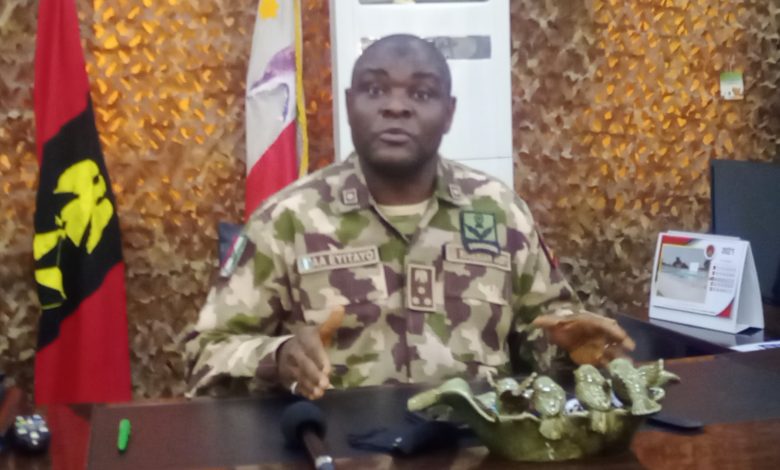
The General officer Commanding 7 Division, Nigerian Army, Brigadier General Abdulwahab Eyitayo, said over 11,000 former Boko Haram terrorists have surrendered to the government troops in Borno State, Northeast Nigeria.
General Eyitayo who spoke with HumAngle on the matter credited “renewed working synergy” among the various security outfits for the recent successes being recorded in the war against terrorism in the country.
“It has been very fruitful, and so far people have been trooping out of the bushes and surrendering to our troops even though other factional hindrances are preventing some of them from coming out,” he said.
General Eyitayo said, “since the mass surrender by Boko Haram commenced on July 21 it has not ceased till date.”
“As we speak now, many more surrenderers are still on their way, and by the latest information I got, they are in the region of 11,000.”
“These figures are holistically both the fighters and their families. The number represents every person that comes out of Sambisa or from the other parts of the theatre.”
He said further that ” the surrender is like a response to a clarion call”.
The GOC clarified that the current efforts at deradicalising the repentant terrorists are no longer handled by the military. “The issue of deradicalisation is being handled by the state government,” he said. “We profile them to get the relevant activities about their roles and theory background, where they came from and how they got into the Boko Haram group.”
On what the military or government would be doing with a large number of former armed insurgents, the GOC said only those found to be actively combatant would be held back while others may be supported to return to their native communities.
“It is not all of them that are fighters,” he said. “While profiling them, we found out that some are farmers, artisans and fishermen.”
On the issue of whether the military has recovered weapons from the former terrorist that matches the mass surrender, General Eyitayo said that is yet to be achieved.
“The issue of weapons and ammunition is very important to us too,” he said.
“Initially, when they were coming they did appear with their weapons; but later on other factions who were against their surrender insisted that if they must leave the bush, then they had to do so without their weapons.”
“The first thing they did before allowing them to come out was to disarm them. Later on, the insurgents devised another strategy of issuing weapons to their fighters when they had an attack operation to conduct.”
“So that made it impossible for many of them to come out with their weapons. Some commanders who had weapons under their control in their units still came out with their weapons – but it is just the arms. After all, few.”
General Eyitayo also said while the level of threat that could be posed by unarmed insurgents is very low compared to the threat they pose with weapons, the military “cannot say Uhuru yet”.
Support Our Journalism
There are millions of ordinary people affected by conflict in Africa whose stories are missing in the mainstream media. HumAngle is determined to tell those challenging and under-reported stories, hoping that the people impacted by these conflicts will find the safety and security they deserve.
To ensure that we continue to provide public service coverage, we have a small favour to ask you. We want you to be part of our journalistic endeavour by contributing a token to us.
Your donation will further promote a robust, free, and independent media.
Donate HereStay Closer To The Stories That Matter




